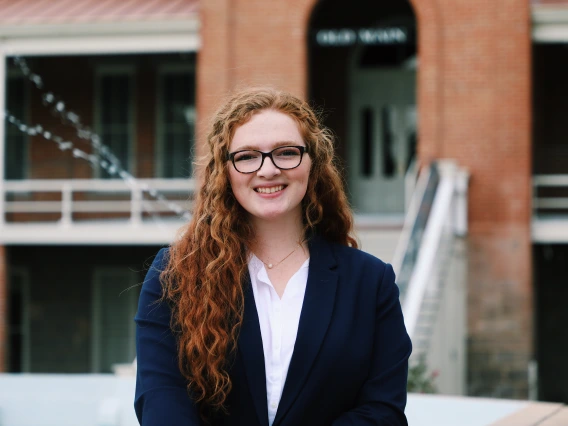
As a French major, new Student Body President Tara Singleton says the skills and perspectives from her Humanities courses are crucial to her leadership role, as well as her career goal to work in human rights law.
Singleton, elected as the Associated Students of The University of Arizona President last semester, says her double major combination of French and Philosophy, Politics, Economics and Law grew out of a variety of passions. Being well-prepared from her Advanced Placement French class with Michel Candela at Sandra Day O’Connor High School in Phoenix, she considered it as a minor when she entered the university, but soon found herself wanting to learn more than just language skills.
“French was something I’d loved in high school and as I started studying it alongside my other major, it became more of an academic pursuit instead of just a passion pursuit,” she says. “Getting into the upper-division film and literature courses were really interesting to me. What could I learn that was more than just the language itself and that’s when I started falling in love with it more. It wasn’t like I was taking a class about French language, I was taking a class in French and that transition was amazing. Once you reach that level with a language, it’s this out-of-body experience.”
With all the time she’s devoting to student government, Singleton doesn’t expect the opportunity for a formal study abroad trip to France, but she did visit the country after high school graduation, which contributed to her love of all things French.
“It was really great to use the language and see the cultural parts and that’s what really pushed me toward the major and the higher academic aspects,” she says. “There’s something about being bilingual or having any kind of foreign language expertise that makes you a better communicator. It unlocks different parts of your brain and lets you think about things differently.”
Having a broad education and learning skills in two distinct disciplines have been a benefit as she’s taken office, Singleton says. ASUA’s mission is to “serve, engage and empower the student body through advocacy and the provision of programs and resources,” which means Singleton communicates with a wide cross-section of students, faculty and administrators on a daily basis.
“Coming from the College of Humanities in general, it’s those people skills that really help me to be open in conversations with people from all diff backgrounds, all different education levels, all different experiences. Talking with students and then executive university leadership, it’s a range of people I work with and it’s those person-to-person skills I’ve gotten from my humanities classes that have really helped,” she says.
Among her goals for the school year are to find virtual ways for students to access the same kinds of clubs, programs, opportunities and resources they could during a normal year. Encouraging students to get involved and emphasizing the benefits of campus involvement, including personal well-being and post-graduate work, are an important part of making the campus a vibrant home for everyone.
“My college experience has been so diverse and great and I’m happy to help students find that for themselves,” she says. “Even within just the French program, I know a lot of the students are double majors, so each one of those classes can be a really cool melting pot.”
Singleton has in mind a post-graduation career in human rights law, another area in which French will give her an advantage. French, along with English, are the two working languages of the United Nations.
“When I realized how prominent French is in the human rights playing field, it became a great coincidence I already had passion for the language,” she says. “A lot of people start thinking about the skill of having a language and using that in the workforce, but it definitely goes beyond that for those who chose to major in a language. It’s a lot more about what that language means and the culture and how thinking in different ways helps your entire experience.
“It becomes less about the language itself and those skills and the communication and the style of learning. It pushes your boundaries and gives you a more global perspective on both what you’re studying and things happening in the world around you. You start to think about other places and their histories, which broadens your perspective of the world and puts you in a different class moving into a very globalized workforce,” she says.
College of Humanities Dean Alain-Philippe Durand and Singleton are both members of the University’s Students Working Group under the Financial Sustainability Emergency Response Taskforce. Durand says that Singleton’s dedication to representing students is evident in one of the working group’s recommendations, to actively promote and encourage the pursuing of a cross-disciplinary curriculum, such as double majors and dual degrees, in order for graduates to acquire broad skill sets.
“I have witnessed first-hand and can attest to her outstanding leadership, collaboration, and critical thinking skills, some of the most sought-after skills on the job market,” Durand says. “Ms. Singleton personifies this kind of students who will be well equipped to take on the world’s grand challenges, but doing it with great sense of empathy, ethics, and justice.”

